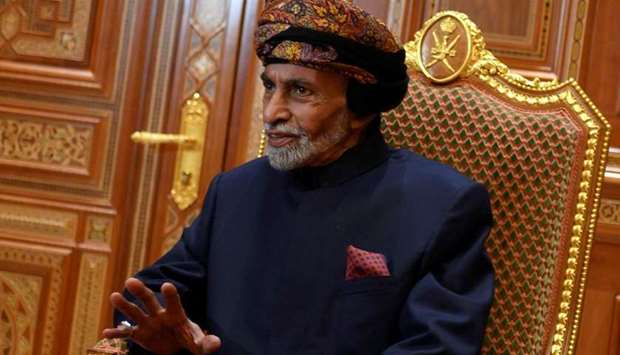Sultan Qaboos bin Said, who died late on Friday, transformed Oman during his 49-year reign from a poor country torn by dissent into a prosperous state and an internationally trusted mediator for some of the region's thorniest issues.
He became Sultan in July 1970 with the aim of ending the country's isolation and using its oil revenue for modernisation and development.
Qaboos, 79, never publicly named a successor but secretly recorded his choice in a sealed letter should the royal family disagree on the succession line. "I have already written down two names, in descending order, and put them in sealed envelopes in two different regions," he said in a 1997 interview.





State television said his cousin Haitham bin Tariq al-Said was named sultan Saturday after the high military council called on the ruling family council to choose a successor. The family had followed Qaboos' written recommendation, believing in "his wisdom and vision", a military council statement said.
State media did not disclose the cause of death. Qaboos, who has dominated decision-making in the Gulf state for decades, had been ailing for years and was in Belgium in December for treatment.
Qaboos healed old rifts in a country long divided between a conservative tribal interior and seafaring coastal region. He became known to his countrymen as "the renaissance", investing billions of dollars of oil revenues in infrastructure and building one of the best-trained armed forces in the region.
While brooking no dissent at home, Qaboos charted an independent foreign policy, not taking sides in a power struggle between Saudi Arabia and Iran, or in a Gulf dispute with Qatar.
Muscat kept ties with both Tehran and Baghdad during the 1980-88 Iran-Iraq War, and with Iran and the United States after their diplomatic falling out in 1979.
Oman helped to mediate secret US-Iran talks in 2013 that led to an historic international nuclear pact two years later.
The white-bearded Qaboos met Israeli Prime Minister Benjamin Netanyahu in October 2018 on a rare visit to Oman. While other Gulf states have made overtures to Israel, none of their leaders have openly met with Netanyahu.
Qaboos, the eighth ruler of the al-Said dynasty that governed Oman since 1744, was born on November 18, 1940 in Dhofar.
In 1958, he headed to England to complete his education, strengthening historic ties between Britain and the Omani royal family. He studied for two years at the Royal Military Academy in Sandhurst and served six months in the British army in West Germany, returning to England in 1962 to study local government.
From 1964-70, Qaboos lived in the royal palace in Salalah.
Assuming power in 1970, Sultan Qaboos, then only 30 years old, inherited a country with little infrastructure, few skilled administrators and none of the basic institutions of government.
Qaboos gradually asserted his authority by taking over the role of prime minister and the ministries of finance, defence and foreign affairs, which he retained.
He fought Dhofar rebels and through military advances and offering rebel leaders state jobs, Qaboos ended the revolt within six years of taking office.
Iran's 1979 Islamic revolution directed Qaboos' attention to the Strait of Hormuz, through which almost a fifth of global oil passes. He pledged to keep the strait open and in 1980 signed a deal to let US forces use Omani facilities for emergencies.
In 1981, Qaboos began widening political participation and free elections for an advisory council were held in 2003.
When the "Arab Spring” protests started and eventually toppled the leaders of Tunisia and Egypt in 2011, Sultan Qaboos took note and defused the situation with promises of jobs and reforms.
He created thousands of public sector jobs and paid a dividend to the unemployed.
However domestic challenges remain with high unemployment and the state increasingly relying on external borrowing as oil prices fell.
"Sultan Qaboos had such charismatic authority and became so synonymous with Oman as a modern nation-state that it will naturally be difficult for any successor to replicate that, at least at the beginning," Kristian Coates Ulrichsen of the Texas-based Rice University's Baker Institute told Reuters.
Qaboos, 79, never publicly named a successor but secretly recorded his choice in a sealed letter should the royal family disagree on the succession line. "I have already written down two names, in descending order, and put them in sealed envelopes in two different regions," he said in a 1997 interview.

France's President Nicolas Sarkozy (L) arrives with Sultan Qaboos Bin Saeed at the Al Alam Royal Palace in Muscat February 10, 2009

Sultan Qaboos bin Said (R) welcomes Jordan's King Abdullah, during a celebration marking the 40th National Day of the Sultanate of Oman, in Muscat November 29, 2010

US Secretary of State Hillary Clinton (L) meets with Sultan Qaboos bin Said in Bait Al-Baraka in Muscat January 12, 2011

Iranian President Mahmoud Ahmadinejad greets Sultan Qaboos bin Saeed during a welcoming ceremony in Tehran

US Secretary of State John Kerry (L) meets with Sultan Qaboos bin Said at Bait Al Baraka in Muscat, May 21, 2013
State television said his cousin Haitham bin Tariq al-Said was named sultan Saturday after the high military council called on the ruling family council to choose a successor. The family had followed Qaboos' written recommendation, believing in "his wisdom and vision", a military council statement said.
State media did not disclose the cause of death. Qaboos, who has dominated decision-making in the Gulf state for decades, had been ailing for years and was in Belgium in December for treatment.
Qaboos healed old rifts in a country long divided between a conservative tribal interior and seafaring coastal region. He became known to his countrymen as "the renaissance", investing billions of dollars of oil revenues in infrastructure and building one of the best-trained armed forces in the region.
While brooking no dissent at home, Qaboos charted an independent foreign policy, not taking sides in a power struggle between Saudi Arabia and Iran, or in a Gulf dispute with Qatar.
Muscat kept ties with both Tehran and Baghdad during the 1980-88 Iran-Iraq War, and with Iran and the United States after their diplomatic falling out in 1979.
Oman helped to mediate secret US-Iran talks in 2013 that led to an historic international nuclear pact two years later.
The white-bearded Qaboos met Israeli Prime Minister Benjamin Netanyahu in October 2018 on a rare visit to Oman. While other Gulf states have made overtures to Israel, none of their leaders have openly met with Netanyahu.
Qaboos, the eighth ruler of the al-Said dynasty that governed Oman since 1744, was born on November 18, 1940 in Dhofar.
In 1958, he headed to England to complete his education, strengthening historic ties between Britain and the Omani royal family. He studied for two years at the Royal Military Academy in Sandhurst and served six months in the British army in West Germany, returning to England in 1962 to study local government.
From 1964-70, Qaboos lived in the royal palace in Salalah.
Assuming power in 1970, Sultan Qaboos, then only 30 years old, inherited a country with little infrastructure, few skilled administrators and none of the basic institutions of government.
Qaboos gradually asserted his authority by taking over the role of prime minister and the ministries of finance, defence and foreign affairs, which he retained.
He fought Dhofar rebels and through military advances and offering rebel leaders state jobs, Qaboos ended the revolt within six years of taking office.
Iran's 1979 Islamic revolution directed Qaboos' attention to the Strait of Hormuz, through which almost a fifth of global oil passes. He pledged to keep the strait open and in 1980 signed a deal to let US forces use Omani facilities for emergencies.
In 1981, Qaboos began widening political participation and free elections for an advisory council were held in 2003.
When the "Arab Spring” protests started and eventually toppled the leaders of Tunisia and Egypt in 2011, Sultan Qaboos took note and defused the situation with promises of jobs and reforms.
He created thousands of public sector jobs and paid a dividend to the unemployed.
However domestic challenges remain with high unemployment and the state increasingly relying on external borrowing as oil prices fell.
"Sultan Qaboos had such charismatic authority and became so synonymous with Oman as a modern nation-state that it will naturally be difficult for any successor to replicate that, at least at the beginning," Kristian Coates Ulrichsen of the Texas-based Rice University's Baker Institute told Reuters.



